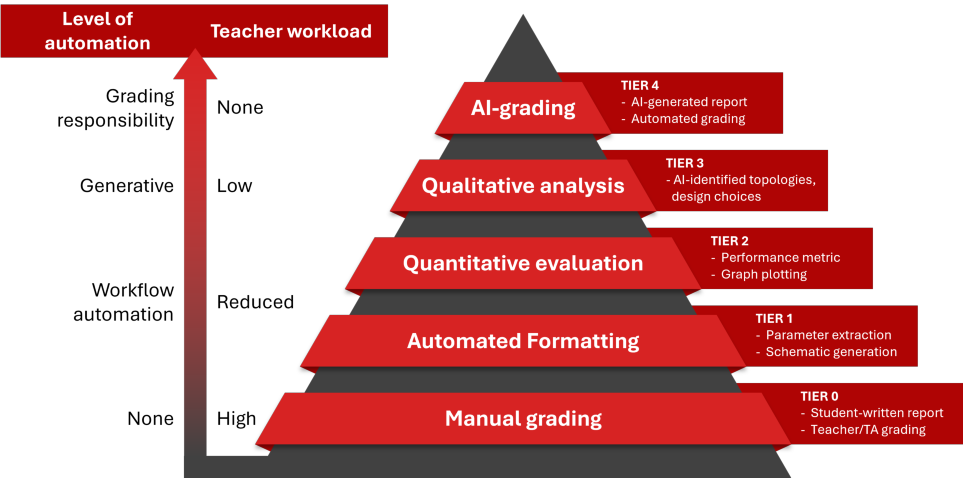Background and General Information
The GRADE project (Generative Review & Automated Design Evaluation) aims to address a pressing challenge in electrical engineering education: how to effectively and efficiently assess circuit design skills. As enrollment numbers in courses like Advanced CMOS Design (5SFC0) have grown significantly, from 20 students in 2021 to 65 in 2024, traditional assessment methods are becoming unsustainable. Current approaches, such as oral exams and written reports, either scale poorly or fail to capture key aspects of design competence. With rising demands linked to the national Project Beethoven initiative, which supports the semiconductor industry, the need for scalable and realistic assessment tools has become more urgent. GRADE introduces an automated e-assessment method using Cadence™, the standard industry tool for chip design. Students work on realistic, industry-aligned tasks during exams and assignments, which are then evaluated using a multi-tier grading system. These tiers range from basic formatting tools to AI-generated summaries and even full automation. The system is designed to streamline grading while maintaining academic integrity and providing rich feedback. The pilot is embedded within the Integrated Circuits research group and supports TU/e’s vision of scalable, personalized, and industry-relevant engineering education.
Goal of the Project
The main goal of GRADE is to develop and implement a scalable, automated system for assessing student work in integrated circuit design courses. By doing so, the project seeks to ensure that rising student numbers do not compromise the quality of education or overwhelm teaching staff. Specifically, GRADE will integrate circuit design exercises into both in-course assignments and final exams, using Cadence™ as the main design and simulation platform. Students will be challenged to solve authentic engineering problems under realistic constraints. The assessment system itself will evolve through multiple tiers of automation: from manual grading, to formatting support, quantitative evaluation, AI-assisted summaries, and ultimately full automation. This tiered approach allows for flexibility and gradual implementation. The innovation not only reduces grading workload but also enables faster and more objective feedback. Additionally, the project emphasizes alignment with industry practices and supports flexible, location-independent assessment. In alignment with the EU AI Act, the system will be designed with human-in-the-loop safeguards to ensure transparency, fairness, and student protection. Automated grading components are always supervised and signed off by qualified instructors, maintaining accountability throughout the assessment process. Over time, GRADE is intended to expand beyond a single course, with potential applications across other design-focused programs within TU/e and partner institutions in the 4TU and EuroTeQ networks.



